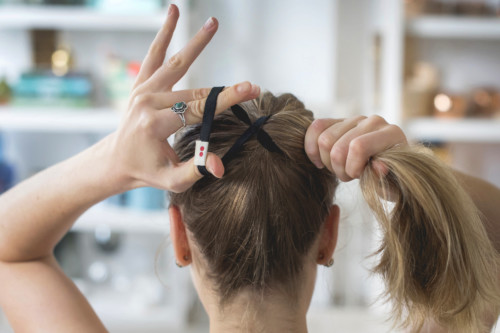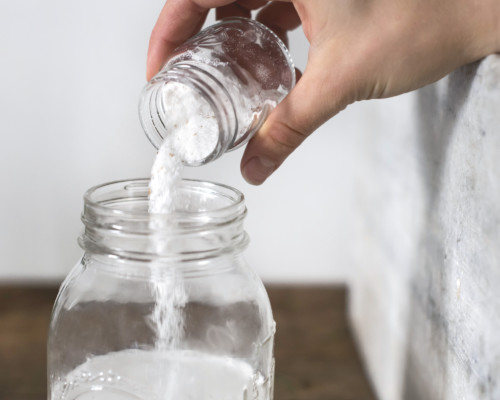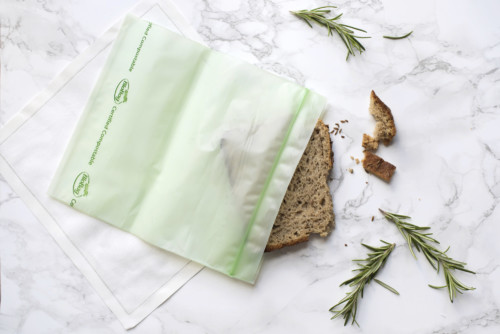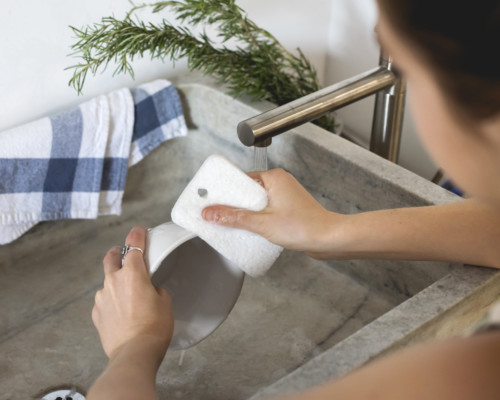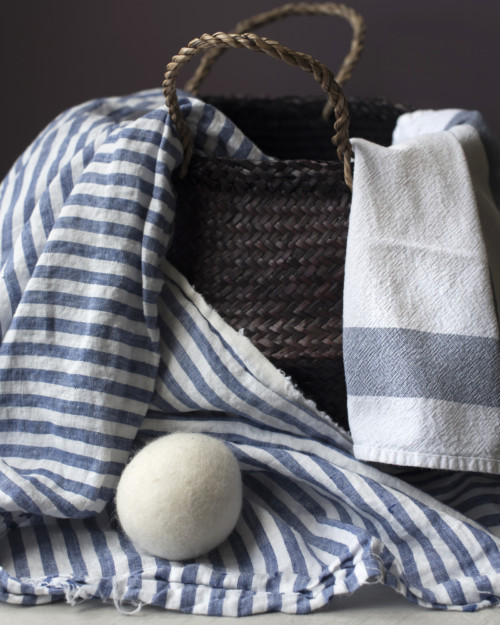
Natural Alternatives to Household Items You Didn’t Even Realize Were Bad for You
From the “Dirty Dozen” of produce to the “Toxic Twelve” of skincare, public awareness about the dangers of chemicals in consumer products has never been higher– but there are still a few household items that are so low-use that most people don’t think about their chemical or biological makeup.
Just like food or skincare, the items we use to clean, perfume, and beautify our homes should all be subject to a chemical audit. Below, we spotlight a few common household items that most people don’t even realize are bad for them and/or the the environment. Check out the list (and our recommended substitutes) below.
KooShoo Organic Hair Ties (Made Without Plastic)
KooShoo hair ties are the only organic hair ties on the market, made from organic cotton and natural rubber to support healthy and safe environments from crops to manufacturing.
The paper on which the elastics come wrapped is printed in Vancouver on 100% recycled fiber paper and locally made in an ethically-operated facility (this might seem insignificant, but popular hair tie brands like Scünci and Goody make their elastics from chiffon and plastic, which amounts to hundreds of thousands of pounds of non-biodegradable waste each year). KooShoo’s contoured band also makes for a no-slip grip that locks in hair without damaging it– a boon to your locks and the environment.
Earth Enzymes Instead of Drain-o
Drain-o is often listed up there alongside bleach as being one of the most aggressive household cleaners one might accidentally inhale, but few people know that there are actually effective, natural alternatives to the former.
[easyazon_link identifier=”B004L9V00U” locale=”US” tag=”gardcoll03-20″]Earth Enzymes[/easyazon_link] is a natural alternative to dangerous, corrosive drain openers that can effectively remove the buildup that results from food particles, grease, and other human waste. Earth Enzymes can be safely used in garbage disposals, tubs, kitchen sinks, toilets, and laundry drains. (The biodegradable and phosphate-free formulation is also safe for septic tanks.)
To activate the product, dilute two cups of Earth Enzymes with two quarts of warm water and pour liquid down the drain once the solution is completely dissolved. Allow to work for 24 hours, then flush with water to clear drain lines. The product also works well as a “maintenance cleaner”– simply dilute two teaspoons of powder with one cup of warm water and pour down the drain once a week. Follow each time with two cups of water, and you’ll never need to use Drain-o again!
Bio Bags Instead of Plastic Sandwich Bags
By now, most people know about the dangers of plastic Tupperware containers (which can leach chemicals into food when heated or frozen), but what about those handy sandwich bags?
Studies show that dioxin and Bisphenol-A (BPA) can leach into food when plastic is exposed to high temperatures, which in turn can cause hormonal problems and other endocrine disruption in humans and animals. Plastic bags, moreover, end up in oceans, landfills, and pretty much every natural environment on Earth thanks to conspicuous consumption. While Ziplock (perhaps in response to public outrage) now makes bags that are dioxin- and BPA-free, other plastic sandwich bags run the risk of denaturation (plus, all plastic is made from petroleum– is that really something you want exposed to your food?).
For the plastic-phobic foodie, eco-friendly sandwich bags like [easyazon_link identifier=”B01AHGD1S4″ locale=”US” tag=”gardcoll03-20″]Bio Bags[/easyazon_link] (which are made from corn husks) are plastic-free and compostable– so they won’t end up in landfills or in your bloodstream.
Cellulose Sponges Instead of Sea Sponges
Sea Sponges are simple organisms that survive by filtering microscopic plants and oxygen from ocean water and growing slowly over many decades.
While historically sponges have been harvested for their ability to hold and discharge massive amounts of water, only two of approximately 5,000 different sponge species are harvested for this purpose (exfoliating Honeycomb, Hippospongia communis, and smooth Fina, Spongia officinalis) and we still known relatively little about the ecosystem services and role that sponges play in our oceans. (Some species of sponge are a food source for the endangered Hawksbill Sea Turtle, and according to the Australian Marine Conservation Society, ocean sponges–like coral– face extreme threats from Global Warming.)
In order to avoid the moral ambiguity of harvesting a soon-to-be-endangered organism, try purchasing natural cellulose sponges (made from renewable plant fibers) wherever possible. [easyazon_link identifier=”B005GRCWVM” locale=”US” tag=”gardcoll03-20″]Twist Sponge Blossoms[/easyazon_link] (available at Whole Foods Market retailers) are both chic and functional– the dye-free sponge is made from 100% plant-based, glue-free cellulose. And with their chic white design and fashionable twine hook, they make a beautiful addition to any eco-conscious kitchen– and a great gift for homeowners and cooks!
Wool Balls Instead of Dryer Sheets
Dryer sheets might be useful in reducing static cling and removing wrinkles from clothing, but most dryer sheets contain the same noxious chemicals that can be found in liquid fabric softener, like benzyl acetate, benzyl alcohol, and ethanol (which have respectively been linked to pancreatic cancer, upper respiratory tract irritation, and central nervous system disorders).
Dryer sheets can instigate allergies or asthma symptoms, and are often linked to contact dermatitis, as several of what are known as the “Toxic Twelve” chemicals are often found in dryer sheets.
Instead, try adding a wool ball to your dryer– an investment that literally pays for itself as once you purchase it, you’ll never have to use laundry sheets again (which saves more waste from entering our ever-expanding landfills).
Wool is a natural, anti-wrinkle static absorber, and you can even add a few drops of essential oil to the ball before use if you’d like to perfume your laundry with a bespoke fragrance (I use sweet orange oil and/or lavender oil). I like [easyazon_link identifier=”B01M4MJ9Z9″ locale=”US” tag=”gardcoll03-20″]Kintor’s Organic Wool Dryer Balls[/easyazon_link] from New Zealand, but there are a number of viable and cheap options on the market– just be sure to go with something made from sustainably-sheared wool.


























